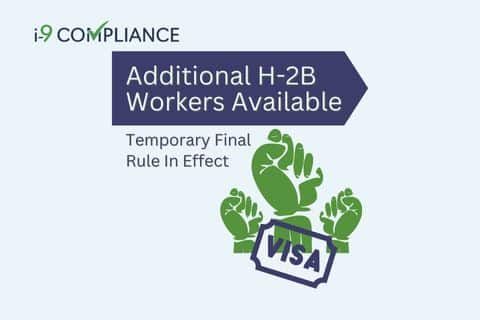Temporary Final Rule Making Additional H-2B Workers Available In Effect

January 08, 2024
Recently, the Department of Labor (DOL) and the Department of Homeland Security (DHS) jointly filed a temporary final rule. It took effect on November 17, 2023. The rule will make 64,716 additional H-2B temporary non-agricultural worker visas available for the 2024 fiscal year.
The 64,716 visas will be available in addition to the standard 66,000 H-2B visas. Of the additional released visas, they will reserve 44,716 for returning workers with H-2B visas and those with H-2B status in at least one of the three previous fiscal years. The reserved amount for fiscal year 2024 reflects the number from fiscal year 2023.
The other 20,000 additional H-2B visas will go to Honduras, Ecuador, El Salvador, Haiti, Columbia, Guatemala, and Costa Rica nationals. This reservation will disregard whether workers had an H-2B visa or status in the previous three years. Some countries are new to this list of countries eligible for nationality-based supplemental H-2B visa numbers.
Previously, only Haiti, El Salvador, Honduras, and Guatemala were on the list. Fiscal year 2024 will follow the example of previous years and require employers to meet specific criteria for eligibility for supplemental H-2B visas. As such, employers must prove they are suffering or will suffer irreparable harm without employing all of the workers they requested in their petition.
From January 25, 2024, to January 24, 2025, employees already in the U.S. may start employment with another employer. Furthermore, they may file an H-2B petition for up to 60 days. This change removes the requirement of waiting for approval of their petition to begin work due to the TFR’s temporary portability provision.
Some employers in industries relying heavily on seasonal workers often risk labor shortages without H-2B workers. As such, these additional H-2B visas will help these employers. However, the increase is only for the 2024 fiscal year. Because this does not change the H-2B program for coming years, more must happen to solve these labor issues.
Employers hiring H-2B workers must complete the employment eligibility verification (Form I-9) process. The law requires employers to complete this process for all new hires. However, the process has proven challenging for these workers due to the many different forms of documentation they may present.
The best way to ensure all new hires complete the Form I-9 correctly is to use an electronic I-9 management system. This system can guide employers through the steps and ensure hiring personnel know which documents are suitable to prove work authorization.
Learn more about automating your employment eligibility verification and ensuring compliance with I-9Compliance.